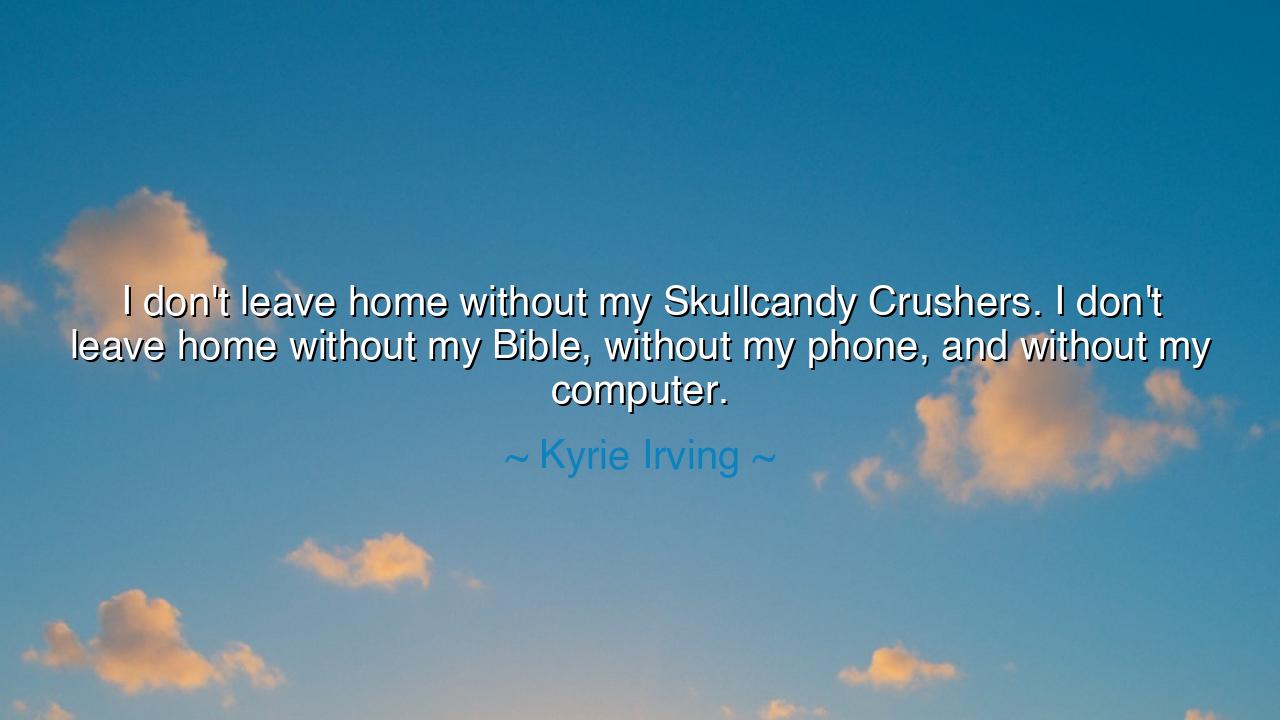
I don't leave home without my Skullcandy Crushers. I don't leave
I don't leave home without my Skullcandy Crushers. I don't leave home without my Bible, without my phone, and without my computer.






In the earnest and modern confession of Kyrie Irving, the athlete whose journey has been both bold and introspective, we hear the voice of a man grounded between spirit and motion: “I don't leave home without my Skullcandy Crushers. I don't leave home without my Bible, without my phone, and without my computer.” On the surface, these words may seem like a simple list of necessities—a casual declaration of what one carries in daily life. But beneath their simplicity lies a powerful reflection of our age: the merging of the spiritual and the technological, of tradition and modernity, of solitude and connection. Irving’s statement is not about possessions; it is about balance—the delicate harmony between the soul, the mind, and the world.
Kyrie Irving, known for his artistry on the basketball court, is also a man deeply engaged with questions of faith, identity, and self-discovery. His words reveal the three realms that sustain him: sound, spirit, and connection. His Skullcandy Crushers represent the rhythm of life, the pulse of creativity and emotion carried through music. His Bible stands as his compass, the foundation of moral and spiritual grounding. And his phone and computer are symbols of the modern world—tools of communication, learning, and expression. Together, these four items form a map of the contemporary soul: one that listens, believes, connects, and creates.
This union between the sacred and the technological has always existed, though in changing forms. In ancient days, the philosopher carried a scroll, the warrior his sword, the monk his scripture. Each carried not just tools, but reminders of purpose and identity. In our age, the instruments have changed, but the meaning endures. Just as the scholar once guarded his manuscripts from the fires of ignorance, the modern seeker carries his devices not for vanity, but to stay linked to knowledge, to others, and to the unfolding world. Yet, Kyrie’s inclusion of the Bible among his essentials reveals that amidst the noise of modern life, the eternal must still have its place. Without it, technology becomes hollow, and progress loses its direction.
There is a story from history that mirrors this harmony. The Renaissance polymath Leonardo da Vinci carried with him notebooks filled with sketches of machines and reflections on God. In his hands, science and faith were not rivals but companions—each deepening the other. Leonardo believed that the study of the physical world brought him closer to understanding the divine. So it is with Kyrie Irving: his computer and phone connect him to the tangible world, his music feeds the heart, and his Bible anchors the spirit. Each part sustains the others, and together they form a complete human being—one who strives not only to perform, but to understand.
But Irving’s words also hold a quiet warning. To carry these things is not enough; one must also know why they are carried. The tools that connect us can also distract us. The Scriptures that enlighten can also be ignored. The music that inspires can drown out the voice of truth if we do not listen wisely. The ancients often spoke of the “middle path,” the balance between indulgence and deprivation. Kyrie’s list, though modern, echoes that same principle. The wise do not reject the world, nor do they lose themselves in it—they walk between, grounded in purpose. His Bible reminds him of who he is; his devices help him express it.
This balance is especially striking for one whose life is lived under the bright lights of fame. For in the world of constant performance, it is easy to lose one’s center. Yet here we find a man who remembers his roots—a man who, before stepping into the noise of arenas and interviews, carries with him sound to inspire, faith to guide, and tools to communicate. In this, he teaches that the truest success is not found in possessions or victories, but in alignment—the harmony of inner and outer life. The Skullcandy Crushers, then, are not merely headphones; they are symbols of focus, of creating space for the self amid chaos. The Bible is not a token of religion; it is the anchor that keeps him from drifting in the tides of fame.
So, my children of the future, take this lesson to heart: know what you carry, and why you carry it. In every journey, bring with you what feeds your mind, strengthens your heart, and awakens your soul. Let your tools serve your higher purpose, not enslave it. Carry your faith—whatever form it takes—as your compass, and let your learning and creativity be its expression in the world. For every traveler must choose their essentials, and what you hold close reveals who you are. Like Kyrie Irving, may you walk each day prepared—not merely with the objects of convenience, but with the symbols of your deeper truth: the music that reminds you to feel, the words that remind you to hope, and the faith that reminds you to stand.






AAdministratorAdministrator
Welcome, honored guests. Please leave a comment, we will respond soon